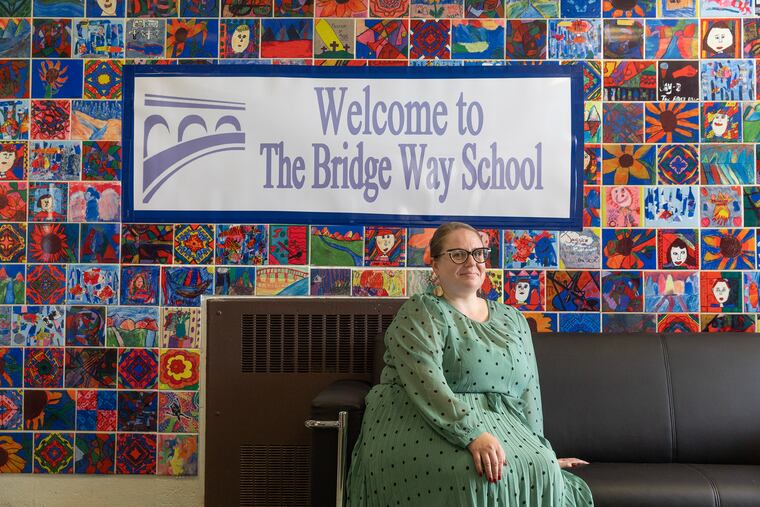Suspension and other punishments won’t deter kids from using drugs. Here’s what will.
As a parent who has struggled with addiction, I lie awake thinking about all the risks our kids face. Here's how I'm talking about them to my children.

As someone who has struggled with addiction, I know firsthand the dangers our children face. As a parent of a 9- and 15-year-old, these fears keep me up at night.
Now that kids have returned to school, I fear we aren’t talking enough about one of those dangers: the rising odds that my child — or yours — will perish from an overdose.
Here’s why I’m worried: The illicit drug supply has grown more lethal, while we are in the midst of a youth mental health crisis that leads many adolescents to pursue the numbing effects of drugs.
As a child, I experienced trauma, then later became dependent on cocaine — an experience that showed me just how linked addiction is to mental health.
Even before the COVID-19 pandemic, one in six youth (7.7 million people) in the U.S. had a diagnosable mental health condition, and more than 10% of youth ages 12 to 17 (and 25% of young adults aged 18 to 25) had a substance use disorder. Between 2019 and 2021, the child and adolescent death rate rose by almost 20%, the fastest increase in 50 years, driven in part by accidental overdoses.
And we adults have responded inadequately.
How to find help
In our homes and schools, kids who are found with illicit substances typically receive swift punishment. This might seem like common sense, but does harsh punishment like shaming at home or suspension from school keep young people from using substances? Does it help them address the sadness, anxiety, or social isolation that might be driving their drug use? The answer is no.
Disciplinary measures like suspensions don’t just fail to do any good, they are actually associated with harm, such as worse academic performance and more involvement in antisocial activities. They also increase drug use and the risk of overdose.
Researchers who examined 10 years of surveys and school records for millions of kids in California found that a greater number of suspensions and expulsions in a given school year were linked to higher rates of depressed feelings and substance use by students the following year. These disciplinary measures — which are disproportionately applied to youth of color — also increase the odds that a given adolescent will become involved in the court system and enter the school-to-prison pipeline.
Simply put, punishing students for substance use won’t work, and could make the problem worse. We must change the way we respond when young people use drugs.
Punishing students for substance use won’t work.
If you’re a parent, start by letting your child know where they can access sound information about drugs, such as the “Safety First” drug intervention curriculum from Stanford Medicine’s REACH Lab and the Drug Policy Alliance. Tell them that help is available if they or their friends are struggling with substance use or a mental health concern, and let them know where to get help, for instance by dialing 988 to reach the confidential Suicide & Crisis Lifeline.
If I discovered my 15-year-old daughter using drugs, I would tell her, “I don’t intend to punish you. My goal is for us to communicate openly and honestly to support your health and well-being.”
These same principles belong in our schools’ response to drug use. Some Pennsylvania schools have already taken the lead.
Here in Philly, the Bridge Way School is a recovery high school in the Northeast where students who are healing from drug or alcohol use have access to mental health counseling and other vital resources. (I serve on Bridge Way’s volunteer board of directors.)
Instead of suspending kids for drug use, some Pittsburgh schools are practicing “restorative justice,” in which the people involved in a difficult event gather to talk about and collectively process what happened, and figure out how to move forward. In the case of a drug infraction, restorative justice might involve a circle in which staff and students together define the harm that occurred and design a remedy that is good for the student, such as meeting with a person who has experienced a substance use issue, or spending time in a drug and alcohol rehabilitation center.
Bringing restorative justice to our schools will not be quick or easy; teachers and other school staff are already stretched too thin. But now is the perfect time to open this conversation, because money from opioid lawsuits has begun to flow into Pennsylvania. Evidence-driven, school-based programs that prevent drug use, reduce harm, and support students working toward recovery are an approved use of settlement funds, and restorative justice is an ideal intervention.
In an encouraging move, State Rep. Manuel Guzman (D., Berks) — who was suspended as a Reading student for 10 days after he threw a paper ball at a bus driver — has introduced a bill that would bring restorative practices to schools statewide. And School District of Philadelphia Superintendent Tony B. Watlington Sr. mentioned restorative practices in his five-year district road map.
These interventions will not by themselves resolve the youth overdose and mental health crises. But by changing the culture such that adolescents feel seen and heard by caring adults, rather than simply punished, we will have made this scary world — and the start of each new academic year — a little safer for our kids.
Sean Fogler is a physician living in long-term recovery, cofounder of Elevyst, a public health consulting group, cochair of the Health Justice for Pennsylvania Coalition, and the father of two children in Philly schools.